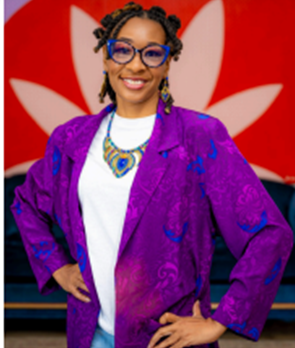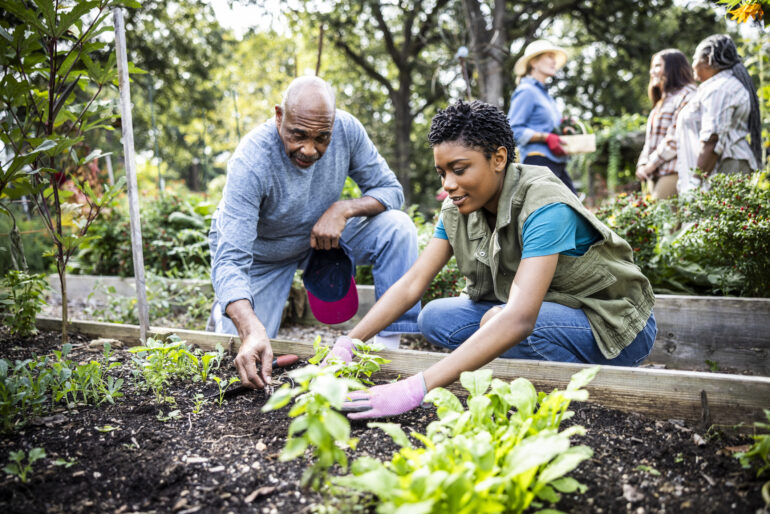This post was submitted as part of our “You Said It” program.” Your voice, ideas, and engagement are important to help us accomplish our mission. We encourage you to share your ideas and efforts to make the world a better place by submitting a “You Said It.”
What if as individuals we embrace the task of being the pollinators of the world? We could see that our role is to plant and nurture seeds of hope – literally and figuratively – to share with neighbors across the generations. This action is called HOPE as it stands for “Healing Our Post-traumatic Experiences.”
The tumultuous times and uncertainty of America’s future leave many grappling with how to begin to process these changes and move forward. One profoundly helpful way is through gardening.
As founder and executive director of BlockBuilderz, with the mission of creating meaningful change in the lives of those impacted by the criminal justice system, the team focuses on the eight dimensions of wellness, as defined by the Substance Abuse and Mental Health Services Administration’s Wellness Initiative. The factors are social, spiritual, emotional, environmental, financial, occupational, physical, and intellectual wellness.
Gardening for Wellness
It is through planting gardens of hope that it is possible to improve many of those wellness dimensions. A 2024 review of 40 studies of gardening and horticultural therapy show “a positive role for gardening and horticultural therapy activities on well-being and general health.”
I’ve been able to cultivate joy by tapping into indigenous practices of gardening that have been passed down through generations. The community garden has proven to offer transformative healing power. Gardening is a form of mindfulness as it gives one the ability for grounding into the earth.
Our recent fall garden has yielded root vegetables such as mustard and collard greens, as well as kale, okra, watermelon, basil and more for the community. Although it’s tapered off to mustard and turnip greens, there is still a bountiful harvest to share in time for Thanksgiving.
Growing Community
Marginalized and under-resourced communities suffer from high rates of diabetes, strokes, cardiovascular-related illnesses and premature deaths. Systemic racism creates these conditions that have devastated communities for generations. The National Institutes of Health 2020 study cites social determinants of health affecting disease and mortality rates.
The harsh realities compounded with the current hostile and divisive political climate has exacerbated fear in communities of color throughout the country.
Learning to lean in and build community by caring for neighbors while simultaneously resisting systems of oppression and harm is necessary. Structural barriers limit access to resources and nature, limiting access to even basic necessities such as fresh food.
Not only is the garden providing nutritious and flavorful food, the outcome is effectuating change by removing structural barriers to access to fresh vegetables. It is about providing quality food as a labor of love.
This is happening throughout the country. In Houston, Urban Harvest has been growing community gardens and offering resources for 30 years. The American Community Gardening Association with hundreds of member gardens throughout the U.S. including Denver, Seattle, N. Carolina and Vermont as well as throughout the world, offers resources and help on developing a community garden.
The Illinois Extension of American Community Gardening Initiative offers resources as well as locations throughout the state. The Los Angeles Community Garden Council has the largest number of gardens in the region and multiple resources on starting a garden.
While the status may change, the U.S. Department of Agriculture’s People’s Garden Initiative through their Office of Urban Agriculture and Innovative Production, in partnership with The National Fish and Wildlife Foundation’s 2025 Five Star and Urban Waters Restoration program, has $1 million in funding available to “support community-based gardens promoting sustainable agriculture practices that benefit people and wildlife.” Applications are accepted through January 2025.
Moving away from operating in a state of panic triggered by what’s happening on a national scale to leading a pathway towards transformative solutions in our neighborhoods is the goal. It is possible to create a transformative change right where we are, starting with the neighbors next door, across and down the street.
The seeds of a garden must be planted in fertile, oxygenated soil. They need water and sunlight; along with nutrients, in order to be able to survive.
People bloom when they have the necessary resources to thrive. The circle of life within a garden is comparable to creating an ecosystem of care in neighborhoods, where each person is tasked with the responsibility to offer support across the generations for the community in which they live. Just as in a garden, people are connected to one another in order to sustain the life cycle.
Block Builderz builds hope block by block. Join in creating pollinator gardens in communities across the nation. Learn how to get involved and connect to “Build Hope” at Blockbuilderz.org.
How To Help
The OpEd Project
The OpEd Project’s mission is to change who writes history. It works with patterns including Yale, Northwestern University, the Ms. Foundation for Women, Rush University Medical Center, Equality Now, and others to impact justice in gender, race, public health, climate, media, democracy, and more.

Block Builderz
The Block Builderz organization’s vision is “to build hope block by block.” Its programs provide a broad and innovative approach to improving the quality of life for justice-impacted people as they reintegrate back into the community.

More From Better
- Growing Solutions: How a Student-Run Hydroponic Farm Is Addressing Food Insecurity in a Chicago Food Desert
- Hunger Doesn’t Have a Season: Help Food Pantries Like ‘Care for Real’ Get Year-Round Support
- 9 Foods You Should Be Eating to Boost Brain Power

D’Marria Monday uses her voice to inspire others. She is a mother, sister, Healer, Social Entrepreneur, Truth seeker, and Truth Speaker. She is the Founding Director of Block Builderz. D’Marria uses her lived experience to create innovative solutions in her community.
Systems of oppression have devastated communities of color for hundreds of years. As a survivor of mass incarceration, D’Marria works to dismantle structural barriers through storytelling, advocacy, legislation, and grassroots organizing.
D’Marria has an intimate understanding of the disparities her community faces, and she uses her expertise to address complex problems caused by systemic racism. She reimagines what transformation can look like by centering the voices of those directly impacted to lead Transformative Change. She is a Public Voices fellow, Transformative Justice Leader, an Op-Ed project.

